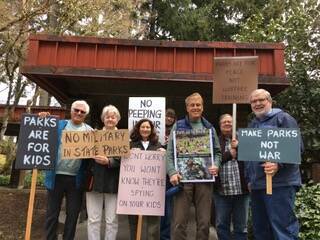In an unmitigated rebuke of the state Parks and Recreation Commission, a judge in Thurston County Superior Court ruled that the commission’s decision to allow the Navy to use 22 Puget Sound parks for military training was outside its authority and violated state environmental law.
The April 1 ruling was a major victory for Whidbey Environmental Action Network, commonly known as WEAN; the longtime environmental advocacy group filed a petition for judicial review against the commission in March 2021. WEAN is supported by the “Not in Our Parks Coalition,” which is made up of about 20 different groups from across the state.
The lawsuit was in response to the commission’s 4-3 decision in January 2021 that directed staff to proceed with permitting the Navy’s plans for covert training in the parks, including the five state parks on Whidbey Island.
Judge James Dixon ruled from the bench immediately following oral arguments, which is a rarity in such cases of public significance.
“I’ve never heard a judge rule like this,” Steve Erickson of WEAN said. “In agreeing with all our arguments, he rebuked the parks commission’s misinterpretation of their mission.”
Dixon agreed across the board with arguments made by WEAN attorney Zachary Griefen.
“Nowhere in statutes may it be implied that the Navy has authority to authorize military training,” Dixon said. “It just does not exist.”
Dixon said the commission violated its purposes and duties set forth in RCW 79.05.
“The decisions made by the commission were arbitrary and capricious,” the judge said. “They exceeded the statutory authority conferred by the legislature.”
Navy SEALs had been conducting clandestine training in state parks for many years without formal approval from parks officials, according to court documents. Then in 2015, State Parks issued the Navy a five-year, right-of-entry permit. When that expired, parks officials required the Navy to go through a public process under the State Environmental Protection Act to continue training.
Navy officials have said the unique terrain and tidal conditions of the public parks provide valuable training opportunities and that nobody has ever complained previously.
In his ruling, Dixon said the SEPA analysis was “clearly erroneous” in not fully considering the impact a military presence — whether seen or not — would have on the public psyche. Many citizens told the commission that they wouldn’t use a park if they knew that the military might be there watching them, which Griefen called the “creep factor.”
During oral arguments, Assistant Attorney General John Heidinger said creep factor isn’t an environmental concern, but that the commission considered it anyway in setting conditions on Navy training.
Heidinger said the conditions prohibit surveillance; daytime training is also banned, though the director can change that after nine months. He pointed out that the Navy activities will not displace any recreational activity.
“If any member of the public was to stumble upon this activity at night, during the day, any time, the Navy will be forced to pick up and move to another location or cease training altogether,” he said.
Griefen, however, said the record is replete with evidence that the training of the “ninjas in the woods” does involve surveillance of the public and will take place at all hours of the day. He said the Navy will be allowed to stay in the park up to 72 hours at a stretch.
In his decision, Dixon pointed out that a reason the Navy gave for wanting to use state parks is that trainees need to practice their concealment skills among unsuspecting members of the public. The creep factor, he said, is a significant environmental concern and would affect the public’s ability to enjoy a park.
The judge’s ruling vacates the commission’s decision and remands the environmental determination for further evaluation.
Amanda McCarthy, interim communications director for the commission, said the members will be reviewing the court’s ruling and no decision has been made regarding a possible appeal.
“At this time, no permits have been issued to the Navy and no training is currently occurring at state parks,” she wrote. “The Commission will be considering next steps. We will post updates to our Navy webpage as information is available.”
In response to an inquiry from the Whidbey News-Times, a Navy spokesperson said officials are discussing the Navy’s next steps, as well as training alternatives, and will have an answer in the future.



